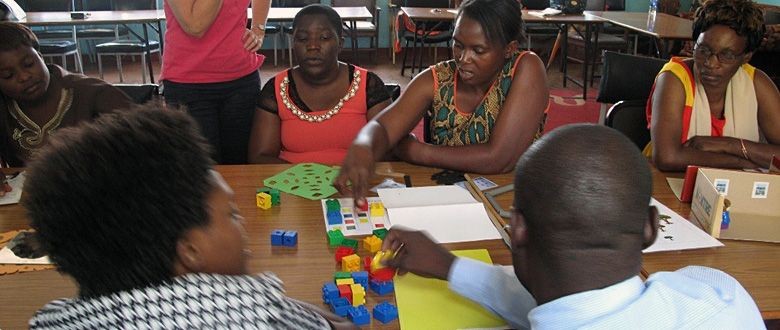
Earlier this year, VVOB started its second project in Zambia co-funded by the European Union. This new project supports community schools in their efforts to strengthen early education. In partnership with Zambia Open Community Schools (ZOCS), the project is being implemented in 18 community schools in the Kitwe and Ndola districts in Copperbelt Province in Zambia.
Community schools in Zambia were primarily set up due to the lack of nearby public schools and/or in response to the inability of families to meet the costs associated with government-provided schooling. Supported by local and international NGOs and, most importantly, embraced by the Zambian government, this local initiative has grown into a national movement. ZOCS is a non-governmental and non-profit making organisation mandated to complement the Ministry of Education, Science, Vocational Training and Early Education in the provision of quality education to orphans and vulnerable children, especially girls and children with special education needs.
Quality Early Childhood Education in Community Schools
The project will run until June 2017 with a total budget of approximately €843,000, with two-thirds of its financing coming through the new European Union grant. By strengthening early education in selected community schools, the project is designed to provide marginalised and vulnerable children with a fair and equitable start in life. In line with the ambitions and plans of the Ministry of Education, Sciences, Vocational Training and Early Education, and building on an extensive body of research demonstrating the importance of children’s early development experience for educational and broader outcomes, the project seeks to achieve three major results:
- Community schools that offer safe, healthy, gender-sensitive and child-friendly environments for early education;
- Local authorities who support the further development and delivery of quality early education services in community schools;
- Early education teachers and head teachers of community schools who are supported in their professional development by Teachers Resource Centres.
Key activities undertaken to achieve these results include infrastructure improvements and annexing of early childhood centres to existing community schools, teaching and learning tools on early education for Teacher Resource Centres, the continuing professional development of teachers, and advocacy for increased attention to early childhood education for parents, communities and council representatives.




